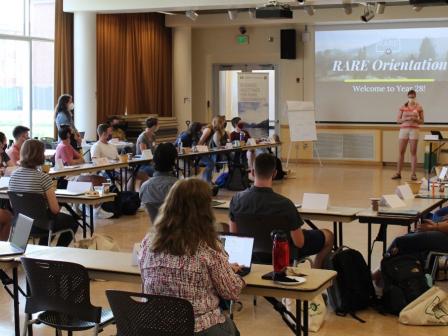
Archived Content
This site contains information that has been considered archived and will no longer be updated.
At the University of Oregon, the Institute for Policy Research and Engagement is Bridging the Divide Between Academia and Practice
Whether it’s developing a business incubator, building new broadband infrastructure, or expanding a wastewater management system, economic development is often a heavy-lifting activity. Sometimes, though, no challenge is as great as bridging the divide between academia and practice. At the University of Oregon, the Institute for Policy Research and Engagement (IPRE) is helping Oregon’s economic development community remove the barriers that separate research from action.
Home to an Economic Development Administration (EDA) designated University Center (UC), IPRE lends the expertise of the University of Oregon (UO) to economic development practitioners in the Pacific Northwest, helping them integrate best practices and emerging research into innovative solutions to regional economic issues. Its past successes include an expansive study on the economic impacts of the 2017 solar eclipse that is helping communities prepare for future events, and the award-winning Disaster Planning for Heritage Resources guidebook.
When the COVID-19 pandemic hit the United States in 2020, however, IPRE faced its biggest challenge yet. Faculty and staff sprang into action, mobilizing resources to provide strategic guidance on resilience and recovery to Oregon’s policymakers and business leaders.
“In June of 2020, we put out a white paper on a framework for economic recovery from the pandemic,” recalls Bob Parker, recently retired as Executive Director of IPRE and now serving as its Director of Strategy and Technical Solutions. Presciently, the white paper identified widespread testing as a key component in securing the state’s successful emergence from the pandemic and laid out the position that the expense of action would be outweighed by the cost of inaction in terms of jobs lost. “Obviously we didn't know at that point that the federal government would have the response that they did.”
An October 2021 study by researchers at the University of New Hampshire’s Carsey School of Public Policy validated the strategic jumpstart IPRE offered Oregon policymakers, finding that Oregon was among seven states with the strongest pandemic-era job growth relative to February 2020 employment levels.
In 2021, EDA awarded additional funding to UO through a CARES Act grant to support expanded pandemic recovery work. Those resources, in combination with support from the Ford Family Foundation, allowed IPRE to grow its successful Resource Assistance for Rural Environments (RARE) program. RARE embeds AmeriCorps Volunteers into Economic Development Districts (EDD), helping expand the geographic reach of the university’s expertise well beyond UO’s Eugene campus.
RARE’s AmeriCorps staff underwent IPRE-administered training in economic development principles and, once deployed, helped rural EDDs put those principles into practice. During the pandemic, they assisted EDDs in completing complex COVID-19 needs assessments, helped businesses source funding for renewable energy infrastructure, and even collaborated with farmers to facilitate the launch of a new local food brand, Klamath Grown.
The RARE expansion was just one of several tactics activated by IPRE to help Oregon recover and rebuild from the economic impacts of the coronavirus pandemic. It also collaborated with social impact consultancy X4 Health to launch Community ROCKit, a COVID-19 recovery planning tool; it undertook a series of state-wide attitudinal surveys to support business leaders and policymakers preparing for the post-pandemic economy; and it participated as a key component of the university’s Community Recovery Branch, which served as an interlocutor between UO and local government on pandemic issues.
“I think it’s one of the most unique things that the federal government does,” Parker explains, in reference to EDA’s University Center program. “It allows us to work with communities in a way that moves the discipline of economic development forward. That partnership of bringing the capacity of higher education into practice is so important.”
EDA’s UC program enables institutions of higher education to establish and operate University Centers focused on leveraging institutional assets to build regional economic ecosystems that support innovation and high-growth entrepreneurship, resiliency, and exclusiveness.
Learn more about the UC program at eda.gov.
